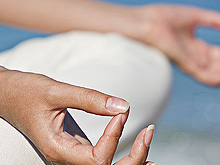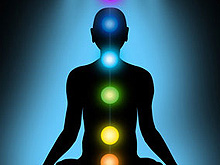REIKI in the News
Reiki for All, Including Pets, at a New Business in New Milford
The Litchfield County Times - June 13th, 2013
Practitioners Mary Oquendo and Pam Pollard believe that the energy therapy known as reiki may benefit animals as well as humans.
“Our vision is for a new concept of wellness,” they state in the literature for their new business, Hands and Paws Reiki for All, which operates a wellness and education center at 375 Danbury Road (Route 7) in New Milford. “We embrace the holistic experience that honors the innate healing intelligence of the body, while integrating the whole family, including pets.”
Ms. Oquendo said that reiki “works to restore a person’s balance emotionally, physically and spiritually. It also can be done with animals. It’s noninvasive, and we don’t have to touch them at all. Usually dogs are agreeable to it, though cats can be a little wary of it.”
According to Wikipedia.com, the” spiritual practice” known as reiki originated in Japan in 1922 with a Buddhist monk and was later embraced and adapted by other traditions. It is more commonly known as hands-on or palm healing.
“You can touch the body and you can work without touching, and you can remain clothed,” said Ms. Pollard during an interview at their spacious center, which has two private areas for treatment, each with a massage table—one for people and another for pets. “You can do it to yourself, too, if you have been ‘attuned,’ or trained to connect to the energy.”
The business partners said they have each attained the master level of reiki training. Ms. Pollard noted that she has studied with William Rand, the founder of the International Center for Reiki Training in Southfield, Mich.
Ms. Oquendo shared that she is currently interested in the Native American medicine wheel, which she is reading about in works by area resident E. Barrie Kavasch, an author and researcher who is known through her association with the Institute for American Indian Studies in Washington, Conn.
Before opening their wellness center in March, Ms. Pollard, who works full-time with Cartus, a Danbury-based relocation service, had established Bethel Reiki, to serve adults and children, operating out of her home.
“I do my own pets—and myself,” she said. “I feel so much better now. I don’t have any aches and pains anymore.”
Ms. Oquendo has an established a mobile pet-grooming service, Pawsitively Pretty Mobile Grooming (www.pawsitivelypretty.com), for dogs and cats. She is the founder of Pawsitive Educational Training, which features webinars for pet professionals and owners, and as a blogger she writes pet-related columns for Groomer to Groomer, an industry trade magazine.
“I’m a certified master pet tech instructor,” the Danbury resident said, noting that she teaches pet first aid classes. “There are 11 of us worldwide, and we mostly are at trade shows, like Super Zoo. We do local classes and will do more through New York Open Center,” referring to the “Center of Holistic Learning and World Culture” (see NewYorkOpenCenter.org).
At a recent trade show at the Meadowlands in New Jersey, the co-partners—who are also co-grandparents, as Ms. Pollard’s son is married to Ms. Oquendo’s daughter—conducted Reiki I and Reiki II classes, which are also available through their center.
“We take my blind husky, Spirit, to any of our classes, and when we travel, he comes with us,” said Ms. Oquendo. “He helps us demonstrate the techniques.”
Ms. Oquendo said she is also an advanced crystal master, having practiced crystal therapy for several years.
“Everything,” she said, “operates on specific measureable frequencies, and crystals always have a stable dominant one. When your own frequencies aren’t stable—because of things like stress or illness, a crystal can help you get balanced.”
Ms. Oquendo said she became interested in “energy work” several years ago. “I started with crystals for seven or eight years and offer crystals and make therapeutic bracelets and dog collars.”
Where pets are concerned, she said the animal lies down on a table and she lays out a circle of crystals around it. The kinds she uses depends on what she is endeavoring to address.
“It could be hypertension, anxiety or stress, arthritis, a neurological disorder, or sometimes you just don’t know—in that case, I use an all-purpose combination,” Ms. Oquendo said.
She shared that she routinely listens to music during her sessions.
“On my Hands and Paws Reiki blog, there is one on music and reiki. I play Steven Halpern’s ‘Chakra Suite’ all day when I’m working. I find animals and I are a lot calmer,” Ms. Oquendo said, referring to the guided meditation CD.
Hands and Paws Reiki For All’s fees are $25 for a 15-minute session, $45 for 30 minutes, and $75 for an hour. The charge for house calls is $85 per hour, with a one-hour minimum.
The center also offers Reiki certification classes and health and wellness workshops, by appointment.
Reiki, a Japanese hands-on therapy, works at balancing the body's energy
The New York Times - June 8th, 2011
She didn't come down from a mountain somewhere, chanting and burning incense. Sema Tihan grew up in North Jersey. She went to NJIT. She had a six-figure career. Then she found her calling.
Tihan, the founder of The Reiki Healing Center of NJ in Wayne, now puts her traditionally trained scientific mind to work to demystify Reiki (pronounced "ray-key"), the Japanese hands-on healing method used for stress reduction, relaxation and to promote healing. As Tihan explains it, it is the "channeling of life-force energy." And, she says, it makes perfect, scientific sense.
"I have a bachelor's in engineering," she says. "I came from science. It's Physics 101. What is all matter made of? Energy. You don't have to be way out there to say, 'OK, if our body is energy, there is a magnetic field around us.'"
And, according to Tihan and other Reiki practitioners, when the body is sick, injured, stressed, sleep-deprived or in any way not in optimum health, the energy is unbalanced. Through a conduit, Reiki can balance that energy, resulting in deep relaxation that creates clarity of mind, patience, focus, pain relief and the body being equipped to heal itself, among other things.
Obvious passion
Tihan speaks of Reiki with an obvious passion. She is not alone.
Fellow Reiki master Karen Overgaard is a licensed practical nurse and clinical coordinator at the Whole Child Center, a pediatric office in Oradell. She enthusiastically discusses her sessions, talking about the pain she feels in her hands when she touches (or even holds her hands over) an afflicted area on someone. Overgaard stops herself and shows understanding for the slightly skeptical silence at the other end of the phone.
"It sounds really, really far-fetched," she admits.
Not to Janet Hamill, a registered nurse and holistic practitioner at Valley Hospital in Ridgewood. Hamill does in-patient Reiki sessions and educates staff and members of the community as part of the hospital's integrative nursing approach.
"It balances the energy that flows through the body," Hamill says of Reiki. "When you're ill or under stress, hospitalized, the energy that flows through your body can become blocked or unbalanced."
Like Hamill, the two other women have hospital experience. Overgaard gets called into Hackensack University Medical Center to have sessions with patients. Tihan spent a year on an oncology floor at Morristown Memorial Hospital. They each could spend all day telling patients' stories illustrating the positive effects of Reiki. For cancer patients, it obviously didn't mean a cure, but in many situations it created hope and a better overall state of mind and body to fight.
An open mind
"It makes you feel lighter," says Overgaard. "If you've got like kind of the weight of the world on your shoulders, it makes you feel like, well, now I can deal with it."
For most adults, it's a matter of having an open mind. To see how it works when there is no rush to judgment, it might be best to watch a child.
Sean Ender is a 9-year-old with Joubert Syndrome, a disorder characterized by decreased muscle tone, difficulties with coordination and cognitive impairment. Sean is on the mild end of the Joubert spectrum. Mainstreamed in Washington Township schools since kindergarten, he is now in third grade and starting to see he is different from his classmates.
"It's hard for him to understand it," says his mother Allison Ender.
"There's been anxiety and frustration – a lot of frustration – and acting out. So I was reaching out in different directions."
As part of that process, the Enders changed pediatricians, and are now patients at the Whole Child Center . There they became reconnected with Overgaard, who was formerly an RPN at the Enders' previous pediatrician's office. When Ender learned that Overgaard offered Reiki sessions, she decided to give it a shot with Sean.
'Keeps him calm'
She saw the results immediately.
"It keeps him calm, he walks out of here happy and calm and focused," she says.
And while siblings and friends and life in general can bump him off the tracks, most of the time, the calm lasts.
"I feel that it stays with him, solidly, for a couple of days," says Ender. "Even if he starts to get frustrated he's able to pull himself out of it and calm himself down quicker. We also do a traditional psychologist. I think that's helpful. [But] I feel like this reaches him at a different level."
Sean doesn't know about the energy in him or around him or Overgaard's balancing act.
He knows he comes for Reiki, something like massage, and he knows how it makes him feel. Leaving a recent session, Sean was clearly changed. Gone was the excess energy and jerky movements and in its place was a happy calm in mind and body.
"Children have an open mind," says Ender.
"They don't judge what adults do. They don't question it. They aren't cynical. For him to go in that first time and feel so good from it, really makes you think that yeah, there's definitely something to it."
For Patients With Dementia, Hands-On Comfort
The New York Times - April 5th, 2011
You can see the logic. Old people with dementia can become frightened and restless, angry or agitated. Reiki, a Japanese healing practice that supposedly channels a universal energy, is said to be soothing and deeply relaxing. So why not offer reiki to elderly dementia patients?
Home Care Partners, a nonprofit home care agency in Washington, won a two-year grant from the federal Administration on Aging to give it a try and has just finished training 36 aides in reiki. Next year, the agency will offer reiki training to family caregivers and to workers at adult day programs.
“It relieves stress, it reduces anxiety and it can help diminish pain,” said Marie Muller, the agency’s education manager and a trained reiki master. “We hope that our clients with dementia who become agitated and stressed will find reiki calming” — and thus will be less disturbed when aides help them bathe or dress or eat.
Even at this early point, Ms. Muller said, aides are beginning to see benefits. One reported that reiki, which involves gently placing hands on a patient’s clothed body (or just above it) in prescribed positions, was helping a client with painful arthritis. “She could feel the warmth, and her knees hurt her less,” Ms. Muller said. “The aide could observe her walking better.”
Scores of hospitals are also believers. At Portsmouth General Hospital in New Hampshire, for instance, two staff practitioners and a half dozen volunteers offer free reiki to all patients, family members and staff, last year providing more than 2,100 sessions.
“People say they just feel comforted,” said Christina Niles, the hospital’s reiki director, citing patient surveys. “I personally believe reiki is healing. Not everyone at the hospital agrees, but everyone thinks that people feel better afterward.”
The fly in this particular ointment: scant credible evidence of effectiveness. “There hasn’t been adequate research done to draw any kind of conclusion about whether reiki works or not — or even, from a scientific standpoint, what reiki is,” said Dr. Nassim Assefi, an internist in Seattle who researches alternative medicine.
Most studies of reiki have obvious flaws: the numbers of patients are too low, or the experiment isn’t randomized or blinded — meaning that patients seek reiki out (and thus are more likely to believe it’s beneficial) and know what they’re getting. The aides at Home Care Partners will fill out surveys reporting changes they observe in their clients receiving reiki, but without controls that, too, is a subjective measure.
One of the few rigorous, controlled, randomized and blinded studies — the gold standard in Western medicine — was Dr. Assefi’s own, involving 100 middle-aged fibromyalgia patients in Seattle. Whether they were randomly assigned to standard hands-on treatment by a reiki master, to “distant” reiki in which the master focused “healing intention” from two feet away, or to fake reiki from an untrained actor who mimicked the positions, the results were the same: no significant improvement of symptoms after eight weeks of twice-weekly treatments.
Yet Dr. Assefi — who has trained in reiki and acupuncture, among other alternative therapies — said that her own patients love reiki.
One could debate whether it makes sense to promote an Eastern therapy when Western research methods fail to document its value. “What do you do when the science isn’t really there?” Dr. Assefi mused. “Should it be covered by insurance? Should we spend money on it?” The grant to Home Care Partners, for instance, comes to $250,000 over two years.
But it’s also true, according to the National Center for Complementary and Alternative Medicine (part of the National Institutes of Health) that the practice appears safe, with no serious side effects reported. If reiki can calm people suffering from dementia, regardless of whether the effect is measurable, maybe it’s a good addition to a caregiver’s toolbox.
If you’ve tried reiki, or an elder friend or relative has, I’d like to hear about your experience.
Meanwhile, Ms. Muller, who has used reiki to reduce cancer patients’ nausea and fatigue and whose own 90-year-old mother appreciates it, is anticipating happy results. “Each person will respond in a different way,” she said. “But we’re really hopeful that we’ll see some positive effects.”
Reiki: Touching the Intangible
The Washington Post - May 9th, 2008
Hospitals throughout the Washington area have, in recent years, been enlisting the services of people like Luann Jacobs, an Arlington-based reiki (pronounced "ray-key") healer.
Jacobs, founder of ReikiPartners, spends a portion of her days working with patients at George Washington University Hospital, laying hands on them in a way she, and many others, thinks reduces stress and promotes healing. Starting at the head and slowly working their way to the feet, healers place their hands on or just above different parts of a patient's body. (Unlike massage, it's a very light amount of pressure, if any at all.)
There's no scientific evidence behind their claims, but reiki healers believe that during sessions, they're tapping into a universal source of energy that is then transferred to the recipient.
Reiki was developed in Japan in the early 20th century and can cost $60 or more for hour-long sessions here. But several practitioners in the region accept pay-what-you can donations and offer reduced prices for sessions while they are learning the craft.
Meitia Hedge, who works at the World Bank by day, moonlights as a reiki practitioner, accepting donations for her Saturday afternoon sessions in Takoma Park. "Anybody can have treatments," she says. "If you don't have any ailments, it will optimize your feeling of wellness."
Even if they don't feel like much is happening during the process, Hedge says, her clients almost always report sleeping better after an hour of reiki.
"When I receive it, sometimes I feel heat in certain places," says Cheryl Jones, a Cheverly music teacher and one of Hedge's clients. "But it's not always a physical sensation -- it's more an overall feeling of peace. I get a lot of clarity, insight."
Jones, who was first introduced to reiki when she worked as a chaplain at the Washington Hospital Center, understands that the concept of the practice can be hard to grasp. "It can be ethereal sounding -- intangible," she concedes. "But the benefits are tangible, even if they're hard to explain."
-

Debby C.
Reiki has changed my life. I have searched for years and tried all sorts of 'methods' to find 'the answer'. yet, from the very first time I experienced Reiki, I felt I was "home". learning to heal myself and others using reiki energy... Read more
-

S.Nabeela Abdullah
I have been on this beautiful Reiki journey for over three years since I took the plunge and enrolled myself in the Reiki Level 1 workshop with my teacher, Priya Sethi. Level 1 was a wonderful experience... Read more
-

Christine Ashton
Priya Sethi was my inspirational teacher for Usui Reiki at Level 2 Reiki and Level 3a, which I was just able to squeeze in before I had to leave the country on a new assignment. Otherwise, I would have been able to do the... Read more
-
Connect With Us
Upper Saddle River,
New Jersey 07458201-723-1295



-
Business Hours
Business hours are flexible according to pre scheduled Appointments and Workshops.
-
Gallery
-
REIKI in the News
-
For Patients With Dementia, Hands-On Comfort
-
Reiki, a Japanese hands-on therapy, works at balancing the body's energy
-
Reiki for All, Including Pets, at a New Business in New Milford
-
Reiki: Touching the Intangible
-





